Janine Jackson interviewed RootsAction’s Jeff Cohen and Norman Solomon about Zohran Mamdani and the Democratic Party for the July 4, 2025, episode of CounterSpin. This is a lightly edited transcript.
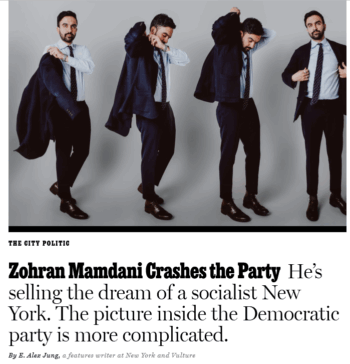
New York (5/20/25)
Janine Jackson: In early June, Raina Lipsitz explained for FAIR.org how media can write about a political candidate in a way that sows doubt about their fitness without attacking them directly. “How to Subtly Undermine a Promising Left-Wing Candidate,” it was headlined.
Since then, Zohran Mamdani, who New York magazine described as “Crash[ing] the Party,” has won the Democratic mayoral primary here in New York City, and things have got a lot less subtle. We have billionaire hedge fund manager Bill Ackman declaring that he will bankroll anyone—you hear that? anyone—who will keep Mamdani out of office. Breaking news as we record, Ackman has said current Mayor Eric Adams will be recipient of his riches—not, as he’s declared, due to any particular fitness on Adams’ part, but because he fills the brief of not being Zohran Mamdani.
Suffice to say, fissures are being revealed, lines are being drawn. And whatever you think of Mamdani or New York City in particular, the question of whether the Democratic Party, as it is, wants to be a part of the future or not is on the table.
And here’s the thing: Plenty of people are not being scared off by the idea that things could change. Elite media have no place in their brain for this concept, and we can expect to confront coverage reflecting that.
Joining me now to talk about this revealing, interesting moment are two people near and dear. Jeff Cohen is the founder of FAIR, founding director of the Park Center for Independent Media at Ithaca College, author of Cable News Confidential and many other things.
Norman Solomon, also in at FAIR’s founding, is executive director of the Institute for Public Accuracy, and author of numerous titles, including War Made Invisible: How America Hides the Human Toll of Its Military Machine, out in a new paperback edition.
They are, together, co-founders of the independent initiative RootsAction, where Jeff is policy director and Norman is national director. They both join me now by phone from wherever they are. Jeff and Norman, welcome back to CounterSpin.
Norman Solomon: Thanks a lot, Janine.
Jeff Cohen: Great to be with you.
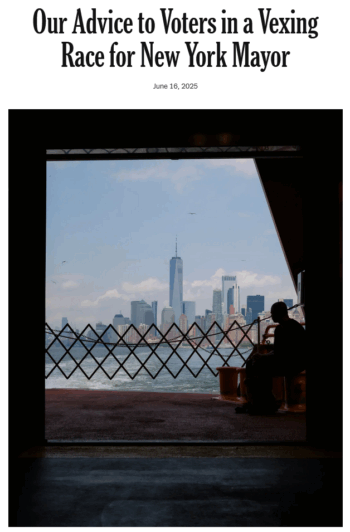
New York Times (6/16/25)
JJ: They’re talking about Mamdani, but they’re telling us about themselves, and the values they represent all the time. I’m talking about news media.
So it’s worth taking a second to breathe in this New York Times editorial; I call it the “sniff heard round the world”: “He is a democratic socialist who too often ignores the unavoidable trade-offs of governance.”
There’s just one sentence, but there’s a lot to unpack. The “trade-offs” for good governance: It’s hard to think of a clearer example of media’s transmission of the idea that somehow politics isn’t really for people. So, Jeff, Norman, why would anyone ask why people are disaffected with electoral politics, when this is the smart person’s explanation of how they work?
JC: It’s pretty revealing when you look at New York Times editorials, because I think middle-of-the-road news consumers, liberal news consumers, they know not to trust Fox News, owned by Rupert Murdoch, or Murdoch’s New York Post. People understand that’s right-wing propaganda.
The moment we’re in, Janine, as you’re suggesting, it’s a teachable moment. Now people are realizing you can’t trust the New York Times, either. You can’t trust these corporate centrist news outlets.
You bring up a Times editorial. Last August, the Times said that they were no longer going to make endorsements in local or state races, but eight days before this primary election, they wrote an editorial that you would’ve thought they wrote so that the billionaires who were funding Cuomo, with this dark money Super PAC known as Fix the City, that was funded by Michael Bloomberg, it was funded by DoorDash, it was funded by Bill Ackman, the hedge fund guy….
It’s almost like the New York Times wrote an editorial attacking Mamdani, after they said they would no longer be making endorsements in local races, it’s almost like they were writing it so they could provide ad copy to Fix the City and attack ads.
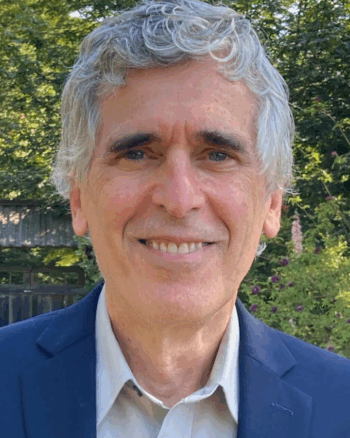
Norman Solomon: “Chief Justice John Jay…said, ‘Those who own the country ought to govern it.’ And that’s really the tacit assumption and belief from the huge media.” (Photo: Cheryl Higgins.)
And I watched the NBA, the pro basketball playoffs, on WABC, channel 7 New York City, and they kept quoting the editorial in the attack ads against Zohran Mamdani. And one of the quotes was, “He’s got an agenda uniquely unsuited to the city’s challenges.” Another quote, “He shows little concern about the disorder of the past decade.” And then, “We do not believe Mr. Mandani deserves a spot on New Yorker’s ballots.” So you had quote after quote.
When the editorial writers of the New York Times are writing an attack on a mayoral candidate like Zohran Mamdani, and they know that there’s a dark money PAC that’s spending millions of dollars to attack him—basically, they were writing copy. And every time a coach during the NBA playoffs called a timeout, I cringed, because I knew there’d be another attack ad that I’d be watching against Mamdani.
NS: To get into the sports metaphor, in the news department, they’re supposed to be referees; they don’t have their hands on the scale. They’re simply reporting the news. But the tonality of coverage, not just in the New York Times, but elite media generally, has been skeptical to alarmed to setting off the sirens that something terrible might be about to happen if the New York City voters don’t wake up.
And when the New York Times editorials talk about something like trade-offs, what they mean is that there is a transactional world that they believe is about democracy, or should be, their version of democracy. I recalled the statement from the first Supreme Court Chief Justice John Jay, who said, “Those who own the country ought to govern it.” And that’s really the tacit assumption and belief from the huge media that, after all, have billions of dollars in assets. That’s what they are accustomed to trying to look out for and protect. I think it’s notable that there’s a long pattern, I mean this has been going for decades.
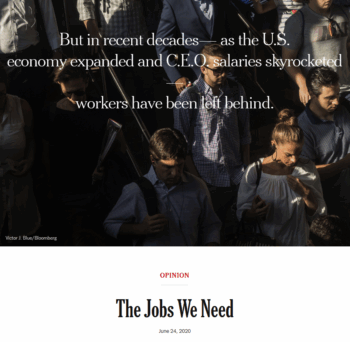
New York Times (6/24/20)
And, again, we’re talking about Fox News and so forth, we’re talking about the New York Times, and in its editorials, the wisdom of its handpicked and, we’re told, very well-informed, erudite editorial board—-a few years ago when Bernie Sanders was surging in the primaries, and it looked like he might be the Democratic presidential nominee, the New York Times went into overdrive of alarm. They published a very big editorial saying Bernie Sanders is just not qualified to be president. He’s dangerous. These socialistic ideas just won’t work.
And after that, years went by, and the New York Times ran a huge editorial about how horrible it is that there’s so much income inequality in the United States, and it’s getting worse and worse, the gap between the very wealthy and the middle class and the poor.
And I think that is really a replica of the split screen approach of the New York Times and the media establishment, which is, on the one hand, to make sure that progressive candidates don’t get very far, if they have anything to say about it as news media outlets. And on the other hand, it’s sort of victims without victimizers, the moaning that there’s poverty and there’s income inequality that’s become so extreme, but there are no victimizers, and certainly Wall Street should be protected rather than attacked.
JC: The beauty of the Mamdani campaign—multiethnic, multigenerational—is there were thousands and thousands of volunteers knocking on doors, and many of them are young. This reminds me of the Bernie Sanders campaign that Norman brought up. Many of them are getting a real education that you can’t trust the right-wing media, and you also can’t trust the media that sees itself as corporate center or corporate liberal.
I love, in the editorial of the Times, eight days before the primary: “Many New Yorkers are understandably disappointed by the Democratic field.” Well, there were some New Yorkers disappointed: It was the New York Times editorial board, which was blasting Mamdani, but they couldn’t, as they usually do, endorse the corporate centrist Cuomo, or be nice to him, because of all of his scandals.
But when it comes to New Yorkers as a whole, they were pretty enthused by the Democratic field, because voter turnout was the biggest in 36 years. So I think what we’re getting here is a real education about how the media spectrum is center-right, including from the New York Times to the New York Post, from the Washington Post to the Washington Times, from MSNBC to Fox News, it’s basically a center-right spectrum. And when a candidate is outside of that spectrum, proposing ideas that are rarely heard inside the center-right spectrum, and is popular, that’s when even the corporate liberal, the corporate centrist media, freak out.
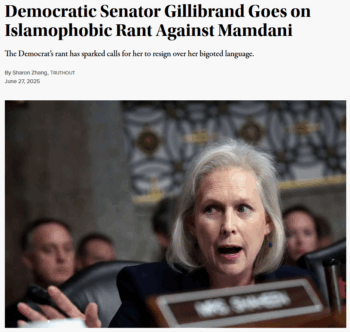
Truthout (6/27/25)
JJ: The first tool in the quiver is blatant Islamophobia. Folks will have seen Senator Gillibrand’s unhinged rant. And we see the distortion and the weaponization of antisemitism. And I just wonder, Norman, Jeff, what you have to say about the idea of using antisemitism as somehow a go-to to attack a candidate who has made very clear—and I mean, again, it’s not about Mamdani, it’s just about the utility of this tool to pull out against anyone who’s trying to do anything different.
NS: It’s really a very strong, powerful and pernicious combination of the zeal to, at all costs, protect corporate power and to protect Israel, which, after all, Amnesty International and Human Rights Watch both unequivocally reported last December, continues to engage in genocide in Gaza. So this is a very powerful and I think dangerous confluence of the concentration of power in the United States.
And all you have to do is read the screed that was put out, hours after Zohran Mamdani won the primary, by Bill Ackman, whose net worth is upward of $9 billion. And the accusation, and I’m quoting here, was “socialism has no place in the economic capital of our country,” and also accusing Mamdani of being anti-Israel and antisemitic. And so that combination is really part of the—I won’t say witches brew, it’s a warlock’s brew of the power structure in the capital of capitalism in the United States, in New York City.
And we’re seeing this in so many different guises, certainly in media, it is pervasive, whether it is the New York Times or the Washington Times or the Wall Street Journal, that’s a part of the theme. And it’s also coming from the power structure of the Democratic Party. The two most prominent New Yorkers in Congress, both, as we speak, are refusing to endorse Zohran Mamdani, even though they are Democrats, he’s a Democrat.
And we’ve had, for instance, the House minority leader, Hakeem Jeffries, of course from New York City, saying that when he’s asked whether he’s going to endorse, the reply is, Well, Mamdani has to show New Yorkers that his Jewish residents of New York City are people who he wants to protect. Well, that’s preposterous, and it’s really a way of saying that if you are not supporting Israel with its genocide, then we have reasons to think that you wouldn’t protect Jews, which is an absurdity with an agenda. It’s part of a decades-long scam in media and politics in the United States that equates Israel with Judaism, and Israel with quote “the Jewish people.”
JJ: And that erases masses of New York Jewish people and Jewish people around the country; they’re completely erased in this conversation, as though they were not speaking their truth and their values and their opposition to Israeli actions.
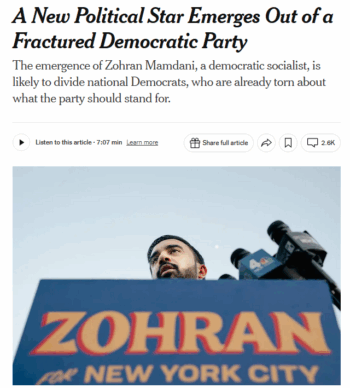
New York Times (6/25/25)
JC: Janine, there was a New York Times news story the day after Mamdani won the primary, and it had this reference that Mamdani’s “running on a far-left agenda, including positions that once were politically risky in New York—like describing Israel’s actions in Gaza as genocide, calling for new taxes on business.”
Well, FAIR has pointed out that, for decades, the polls have shown that even though we have a very narrow debate in mainstream media between center and right, that on economic issues, the public is very progressive. So Pew did a poll in March, 63% of all US adults want taxes raised on large businesses and corporations. It’s been that way for decades. And the New York Times is telling us that’s “far-left” or “politically risky”?
And then, on the issue of Israel, the Jerusalem Center for Public Affairs did a poll of US Jews 14 months ago, May of last year, and found that back then, 30% of US Jews and 38% of US Jews under the age of 44, they were calling what Israel was doing in Gaza genocide. Those numbers are much huger now. So there are a couple million Jews in the US that are calling what Israel is doing in Gaza “genocide.”
And yet in so many Mamdani articles, I see this comment, “He has emphatically denied accusations that he is antisemitic,” but yet the New York Times and other news coverage keeps emphasizing it.
We have evidence from Trump’s comments and Trump’s policies about his racism; but you don’t see, in every other article or every third article, “Mr. Trump has emphatically denied accusations that he is a racist.” But you keep hearing this in Mamdani coverage, and there’s no evidence at all that he’s antisemitic. He’s just critical of Israeli action in Gaza and elsewhere, as are millions of Jews in this country and around the world.

New York Times (3/18/25)
NS: And very much, this kind of media coverage and messaging, it’s a toxic combination of Islamophobia and willingness to promote Israel as some kind of paragon of virtue, even while the genocide continues. I think there’s no clearer incarnation of this mix than Chuck Schumer, the minority leader in the Senate, the most powerful Democrat, arguably, in the country. And a few months ago, Chuck Schumer, in an interview with a very approving Bret Stephens, the columnist of the New York Times, said, and I quote, “My job is to keep the left pro-Israel.” Well, if that’s Chuck Schumer’s job, he clearly is falling short; he’s falling down on the job. And there’s a real panic here.
And then the other clearer aspect of what Chuck Schumer is providing nationally, in terms of politics and media, is his well-earned nickname, “the senator from Wall Street.” And that has been a nickname that he got decades ago. It got new heights just after the financial crisis of 2008. By the following year, the fall of 2009, he had received more than 15% of all the year’s contributions to every senator, from Wall Street.
And when you look at the last year’s donations, when the Schumer campaign committee had to report to the FEC, the six-year donor total for Schumer was $43 million. And more than a quarter of that just came from the financial sector, the real estate interest and law firms and lawyers.
Well, clearly, the real estate interests are going crazy right now, because they’re afraid of a rent freeze. They’re afraid of social justice. They want their outlandish profits to be remaining in full force. So this is really a class war being waged, through media and politics, from the top down.
JJ: And the energy that we get is very much “let’s you and him fight,” you know? Racism, Islamophobia and, yes, antisemitism are all tools that powerful rich people take up to protect their power and riches. It’s much beyond Mamdani, it’s beyond Bernie Sanders. It’s beyond any individual candidate. They will pit us against one another, and then maybe we won’t notice that we’re being robbed blind. That’s the big picture, in some ways.
JC: Agreed. The threat of Mamdani is he’s such a unifier, and that people of various ethnicities, generations, they’ve united behind him. They heard his message, in spite of the millions of dollars of attack ads, and mainstream media seem to be freaking out, from right to center.
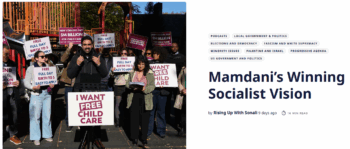
Rising Up (7/2/25)
JJ: I think it’s important to understand that he’s not a unicorn. Sonali Kolhatkar had a show the other day: Across the country, there are people, there are candidates, rising up. There are people who are unapologetic, and they’re resisting the nightmare that you can put Trump’s face on, but it’s not his alone. We know it’s a bigger systemic problem.
We’re talking about Mamdani. Mamdani is not alone. There are folks rising up.
And let me just say, finally, we’re talking about a void, in terms of public understanding and information and energy, and it’s a void that you both have long identified. And that’s why RootsAction exists, right? It’s like people are tired of “Democrat versus Republican,” and want a place to put their energy that is neither of those.
NS: Yeah. Well, the media and corporate power structures, that are so interlaced, to put it mildly, they see genuine democracy as a terrible danger, and any semblance of horizontal discourse in media and politics, and people organizing and communicating with each other, that’s just a terrible threat to the hold that the gazillionaires have on the political process.
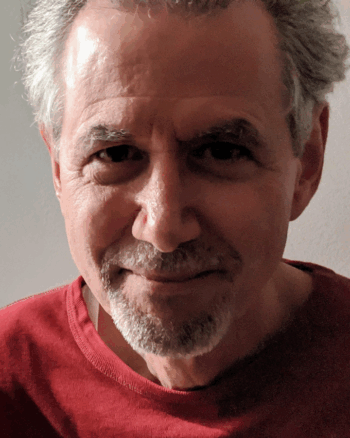
Jeff Cohen: “These billionaires believe that there should be only two choices, and they should both be acceptable to the billionaires.” (Creative Commons photo: Jim Naureckas.)
JC: These billionaires believe that there should be only two choices, and they should both be acceptable to the billionaires.
So you had AIPAC, powerful Israel-right-or-wrong lobby, intervening in Democratic primaries with Republican money, and knocking out progressive congressmembers like Jamaal Bowman in New York and Cori Bush in Missouri. And once you knock out the progressive candidate, and you’ve chosen the Democrat and you’re a right-wing lobby, AIPAC, which loves the Republicans, well, you have both candidates in the race, you cannot lose. That’s not democracy.
And mainstream media understands that’s not democracy when they’re always pointing out, accurately, that the supreme leader of Iran gets to choose and sanction who gets to run for president, who doesn’t. Well, if you’re these billionaires, they believe they should choose both choices for you, and limit those choices, and they freak out when there’s more than just the two choices that they like.
JJ: And then I would say, media make it their job to pretend that, actually, you’re choosing from all the available, reasonable options.
JC: Yeah, if ever there was a time for news media, and thank God we have independent news outlets in New York and elsewhere, and we have nonprofit news outlets in New York and elsewhere. This is a really educational moment about how flawed the democratic system is, how the democracy is so constrained by this money.
And who never complains about campaign finance? The television channels that get all the money from the billionaires to attack a Mamdani in favor of a Cuomo. And now we’re going to get millions of dollars of ads against Mamdani in favor of a very corrupt incumbent Mayor Eric Adams.
But, again, this should be an educational moment about how limited democracy is, and journalists should be explaining the problems of democracy, when the billionaires can have this much power over every aspect of the race.
NS: As we’ve been saying, this is a teachable moment, and it’s a learnable moment. And so many people are learning that the gazillionaires are freaking out.
JJ: We’ve been speaking with authors, activists, RootsAction’s co-founders Jeff Cohen and Norman Solomon. You can start with their work online at RootsAction.org. It will not end there. Thank you, both Jeff and Norman, for joining us this week on CounterSpin.
JC: Thank you, Janine.
NS: Thanks a lot, Janine.
This content originally appeared on FAIR and was authored by Janine Jackson.